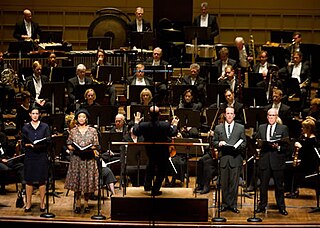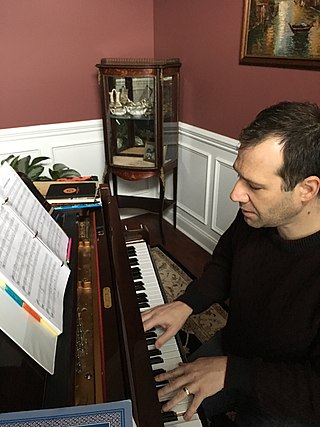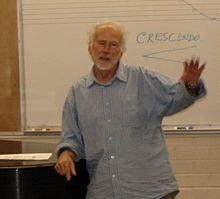John Harris Harbison is an American composer and academic.

Alun Hoddinott CBE was a Welsh composer of classical music, one of the first to receive international recognition.
Miriam Gideon was an American composer.

In Canada, classical music includes a range of musical styles rooted in the traditions of Western or European classical music that European settlers brought to the country from the 17th century and onwards. As well, it includes musical styles brought by other ethnic communities from the 19th century and onwards, such as Indian classical music and Chinese classical music. Since Canada's emergence as a nation in 1867, the country has produced its own composers, musicians and ensembles. As well, it has developed a music infrastructure that includes training institutions, conservatories, performance halls, and a public radio broadcaster, CBC, which programs a moderate amount of Classical music. There is a high level of public interest in classical music and education.

John Jacob Weinzweig was a Canadian composer and teacher of classical music.

Steven Edward Stucky was a Pulitzer Prize-winning American composer.
István Anhalt was a Hungarian-Canadian composer.
Golani was born in Tel Aviv. Her father Yakov Gulnik was from Warsaw, and had lost his family in the Holocaust. Her mother Liza Goldstein was from Polish Galicia. Golani took up the violin at age 7, while her sister Bela learned the cello. Golani was a mathematics prodigy.

John Beckwith was a Canadian composer, writer, pianist, teacher, and administrator.
Bernard Rands is a British-American contemporary classical composer. He studied music and English literature at the University of Wales, Bangor, and composition with Pierre Boulez and Bruno Maderna in Darmstadt, Germany, and with Luigi Dallapiccola and Luciano Berio in Milan, Italy. He held residencies at Princeton University, the University of Illinois, and the University of York before emigrating to the United States in 1975; he became a U.S. citizen in 1983. In 1984, Rands's Canti del Sole, premiered by Paul Sperry, Zubin Mehta, and the New York Philharmonic, won the Pulitzer Prize for Music. He has since taught at the University of California, San Diego, the Juilliard School, Yale University, and Boston University. From 1988 to 2005 he taught at Harvard University, where he is Walter Bigelow Rosen Professor of Music Emeritus.
Steven Dann is a Canadian violist.
John Rea is a Montreal-based composer who won the Jules Léger Prize for New Chamber Music in both 1981 and 1992. He obtained his bachelor's degree at Wayne State University (1967), his Master of Music degree at the University of Toronto (1969), and his PhD at Princeton University. His children's opera The Prisoners Play from 1972 uses serial techniques. His works have been played by the Montreal Symphony Orchestra, the Quebec Symphony Orchestra, the Nouvel Ensemble Moderne, the Arditti Quartet, the Esprit Orchestra and others. He is the previous dean and head of the composition department at the Schulich School of Music of McGill University, from which he has taken his retirement. Among his notable students are composers Robin Minard and John Oliver.
Mark Edgley-Smith [the hyphen disappeared at some point] was a British composer. He was born in Wimbledon and educated at Tiffin School, Kingston upon Thames. There it was soon apparent that he was equally gifted as artist, composer, and litterateur/wit. It was at Tiffin that he began to compose seriously and had his first composition lessons, from David Nield. He won a scholarship (1974) to read music at the Queen's College, Oxford.
Richard Johnston was a Canadian composer, conductor, editor, folklorist, music critic, music educator, music producer, and university administrator of American birth. He became a naturalized Canadian citizen in 1957. An associate of the Canadian Music Centre, he was appointed a Member of the Order of Canada in February 1997. The library at the University of Calgary holds a substantial amount of his papers, manuscripts, and transcripts in its "Richard Johnston Canadian Music Archives Collection". His original fieldwork tapes and transcripts made during his research as a folklorist are part of the collection at the Canadian Museum of Civilization.
Odaline de la Martinez is a Cuban-American composer and conductor, currently residing in the UK. She is the artistic director of Lontano, a London-based contemporary music ensemble which she co-founded in 1976 with New Zealander flautist Ingrid Culliford, and was the first woman to conduct at the BBC Promenade Concerts in 1984. As well as frequent appearances as a guest conductor with leading orchestras throughout Great Britain, including all the BBC orchestras, she has conducted several leading ensembles around the world, including the Ensemble 2e2m in Paris; the New Zealand Symphony Orchestra; the Australian Youth Orchestra; the OFUNAM and the Camerata of the Americas in Mexico; and the Vancouver Chamber Orchestra. She is also known as a broadcaster for BBC Radio and Television and has recorded extensively for several labels.

Christopher Alan Schmitz is an American composer and winner of the 2007 Sammy Nestico Award in Jazz Composition. He is currently a professor of music theory at Mercer University, having previously taught at Southwestern College in Kansas.
The Orford String Quartet was a Canadian string quartet active from 1965 through 1991. They came to be the leading string quartet in Canada, and were well-known internationally.
Phyllis Margaret Mailing was a Canadian mezzo-soprano, teacher, and patron of classical music. She had a distinguished career as a singer, performing across North America and Europe.







